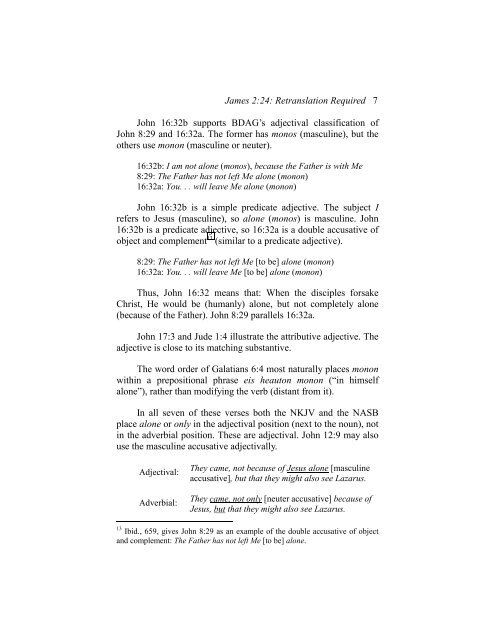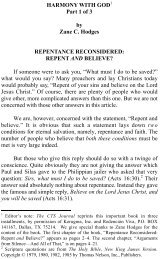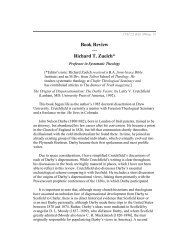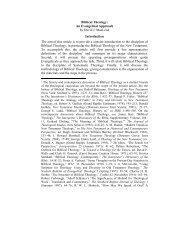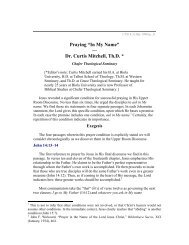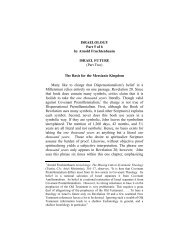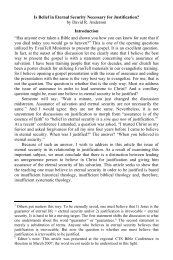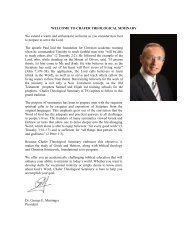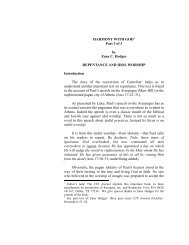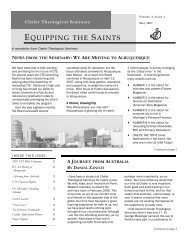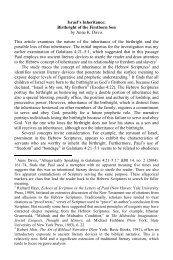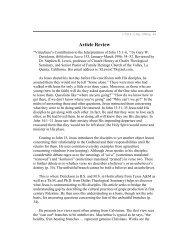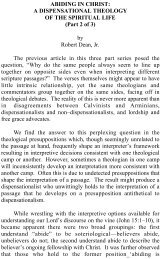JAMES 2:24 - Chafer Theological Seminary
JAMES 2:24 - Chafer Theological Seminary
JAMES 2:24 - Chafer Theological Seminary
You also want an ePaper? Increase the reach of your titles
YUMPU automatically turns print PDFs into web optimized ePapers that Google loves.
James 2:<strong>24</strong>: Retranslation Required 7<br />
John 16:32b supports BDAG’s adjectival classification of<br />
John 8:29 and 16:32a. The former has monos (masculine), but the<br />
others use monon (masculine or neuter).<br />
16:32b: I am not alone (monos), because the Father is with Me<br />
8:29: The Father has not left Me alone (monon)<br />
16:32a: You. . . will leave Me alone (monon)<br />
John 16:32b is a simple predicate adjective. The subject I<br />
refers to Jesus (masculine), so alone (monos) is masculine. John<br />
16:32b is a predicate adjective, so 16:32a is a double accusative of<br />
object and complement 13 (similar to a predicate adjective).<br />
8:29: The Father has not left Me [to be] alone (monon)<br />
16:32a: You. . . will leave Me [to be] alone (monon)<br />
Thus, John 16:32 means that: When the disciples forsake<br />
Christ, He would be (humanly) alone, but not completely alone<br />
(because of the Father). John 8:29 parallels 16:32a.<br />
John 17:3 and Jude 1:4 illustrate the attributive adjective. The<br />
adjective is close to its matching substantive.<br />
The word order of Galatians 6:4 most naturally places monon<br />
within a prepositional phrase eis heauton monon (“in himself<br />
alone”), rather than modifying the verb (distant from it).<br />
In all seven of these verses both the NKJV and the NASB<br />
place alone or only in the adjectival position (next to the noun), not<br />
in the adverbial position. These are adjectival. John 12:9 may also<br />
use the masculine accusative adjectivally.<br />
Adjectival:<br />
Adverbial:<br />
They came, not because of Jesus alone [masculine<br />
accusative], but that they might also see Lazarus.<br />
They came, not only [neuter accusative] because of<br />
Jesus, but that they might also see Lazarus.<br />
13 Ibid., 659, gives John 8:29 as an example of the double accusative of object<br />
and complement: The Father has not left Me [to be] alone.


